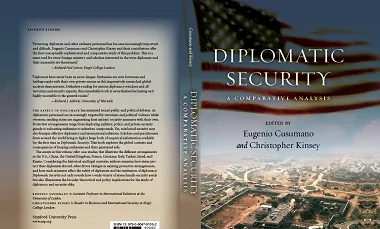Please note: this event has passed
The safety of diplomats has animated recent public and political debates. As diplomatic personnel are increasingly targeted by terrorism and political violence while overseas, sending states are augmenting host nations’ security measures with their own. Protective arrangements range from deploying military, police, and private security guards to relocating embassies to suburban compounds. Yet, reinforced security may also hamper effective diplomacy and international relations. Scholars and practitioners from around the world bring to light a large body of empirical information available for the first time in Diplomatic Security. This book explores the global contexts and consequences of keeping embassies and their personnel safe.
The essays in this volume offer case studies that illustrate the different arrangements in the U.S., China, the United Kingdom, France, Germany, Italy, Turkey, Israel, and Russia. Considering the historical and legal contexts, authors examine how states protect their diplomats abroad, what drives changes in existing protective arrangements, and how such measures affect the safety of diplomats and the institution of diplomacy. Diplomatic Security not only reveals how a wide variety of states handle security needs but also illuminates the broader theoretical and policy implications for the study of diplomacy and security alike.
Editors
Eugenio Cusumano is assistant professor in International Relations at the University of Leiden. His research concentrates on the influence of international norms such as the state monopoly of violence, diplomatic inviolability, and maritime rescue in shaping non-state actors’ provision of security and their interaction with state agencies.His research on Private Military and Security Companies and humanitarian NGOs appeared in leading international relations journals such as the Journal of Strategic Studies, Armed Forces& Society, and Cooperation and Conflict and books published by Oxford University Press, Routledge, and Palgrave.
Dr Christopher Kinsey is a Reader in Business and International Security with King’s College London, Defence Studies Department at the Joint Services Command and Staff College, where he teaches military officers from around the world. His research examines the role of the market in conflict. Dr Kinsey has published widely from books, book chapters and articles in leading academic journals on the subject. He has also presented papers to the UN Intergovernmental Working Group on PMSCs, NATO and the EU Sub-Committee on Human Rights. Dr Kinsey’s present work looks at outsourcing of diplomatic security, regulation of private security companies, the impact of contracted logistical support to military expeditionary operations, and mercenary operations in Africa during the Cold War. His previous books include Corporate Soldiers and International Security, London: Routledge, 2006; Private Contractors and the Reconstruction of Iraq: Transforming Military Logistics, London: Routledge, 2009; the Edited Volume, Contractors and War: The Transformation of United States’ Military and Stabilization Operations, USA: Stanford University Press; the Edited Volume, The Routledge Research Companion to Security Outsourcing, London: Routledge, 2016; and the Edited Volume, Embassies Under Siege: Diplomatic Security Policies Compared, California: Stanford University Press, forthcoming 2019.
Reviewer
Richard Ned Lebow is Professor of International Political Theory in the War Studies Department of King’s College London, Bye-Fellow of Pembroke College, University of Cambridge and the James O. Freedman Presidential Professor Emeritus of Government at Dartmouth College. His most recent books are The Rise and Fall of Political Orders (Cambridge, 2018), Avoiding War, Making Peace (Palgrave, 2017), and Max Weber and International Relations, (Cambridge, 2017). He is a Fellow of the British Academy.

